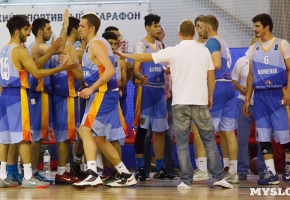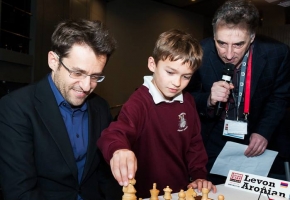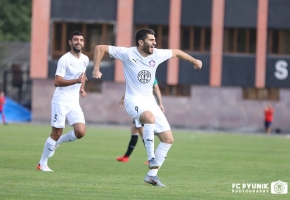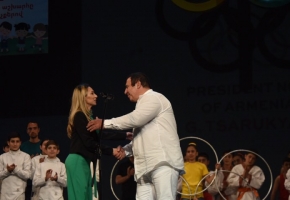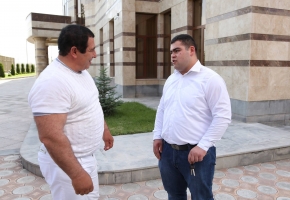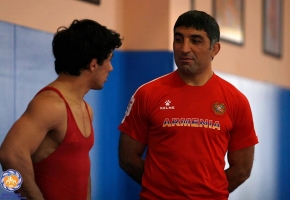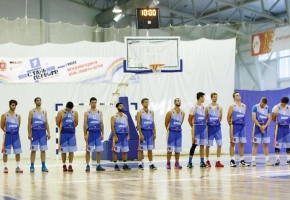Davit Khitaryan: We look like a patient of intensive care unit who is given oxygen for just not to die


The vice president of Armenian Judo federation, Davit Khitaryan in a conversation with an ANOC reporter talked about existing problems in this sport type, their solution and goals.
-Mr. Khitaryan, all three athletes of the Armenian junior judo team returned from the World Championship empty-handed. Two of them were the 3rd prize- winners of the European Championship and the third one was the silver medalist at the 2014 European Championship. The expectations were more. What was the reason of the failure?
-Shahen Abaghyan was the European Championship prize winner, we had to give him a chance. He did his best. We saw that Shahen has enough gaps in his technical base. Vahagn Hovsepyan had the same problem as at the European Championship. In the fight against the Khazakh opponent he lost by yuko. I think the coaches also have a lot to think about. Arsen Khazaryan peaked at the World Championship and then failed. Unfortunately, the failure continued. As well as the others he won one fight and then lost. No one of our athletes could reach the quarter-final and fight for the bronze medal. There are many surprises in our sport. The competitiveness is very high and the obvious leaders can remain without medals
- Apart from surprises don’t you notice some instability in the performances of the athletes?
-Actually the problem is deeper as it seems from the first sight. Judo differs from the other types of sport. I agree medal has special importance, when we get it we enjoy it when don’t we think it’s failure. The problem is that judo is a relatively new here. It prospered after the independence of the country.
-What stage of development is judo in Armenia on?
-The development of each sport depends on finances. In the 1990s our federation’s budget was 21 million drams, now it has reached 71 million due to our activity but it’s not a big sum. We even don’t have a gym or a sports school specialized in judo. It’s a great problem. We organize training camps in sport bases where there isn’t specialized equipment. Abovyan’s sports hall is the only one which is partially consistent with the international standards but it isn’t appropriate to gather there at any time. Now we are waiting for the opening of the judo gym in Olympavan which will be the first specialized gym in Yerevan. The other problem is the lack of competitiveness and pairs in gyms.
-How popular is this sport in our country?
-According to the Ministry of Sport the most popular among individual martial arts is judo. And that’s the problem.
-What about specialists? Does the federation track down what kind of specialists work with children?
-Unfortunately, we aren’t aware of it but we are working in this direction. We should qualify the specialists working with children.
-In some kinds of sport we have a lack of coaches and referees. Do you have the same problem in your sport?
-Yes, we do. We have 5 international referees but only the one is in Armenia. There are international referees here but they are passive. They have no interest of judging competitions. Of course, it’s connected with money. We have done several requests on this issue but it doesn’t depend only on the Ministry. The government has to solve this problem. For example, for judging adult competition referees earn 2000 drams per day, athletes, 2500. There is no difference between qualified and non-qualified referee, everybody is paid equally. Basically, this way choose those referees who are devoted to sport. The federation doesn’t have a qualifying program for coaches. But from time to time we organize seminars for coaches with the National Olympic Committee of Armenia and the Armenian and International Judo federations. We are going to invite a Japanese specialist to the upcoming seminar. The base of judo in Armenia is Soviet and slightly distorted. Our goal is to show and make the specialists close to the real roots of judo. The seminar will be attended by 30-40 coaches. We have also coaches whom we sent abroad for qualification.
-There is another inevitable problem in sport which we face time to time. It’s the change of generation. What measures are undertaken to solve the problem more imperceptibly?
-The transition from juniors to youth is planned. The problem is to form a team for adults. Hovhannes Davtyan and Armen Nazaryan were in our team. Nazaryan finished his sport career but we gave him a chance to work with the national team. Hovhannes Davtyan is 32 but we hope he’ll pass the Olympic period successfully. After him there is a huge gap of 10-12 years. The present adult athletes are recently transited athletes from the youth team. We hope they’ll be completely ready for the next Olympics. These 4-5 athletes are so strong that both in the team and the whole country there are no worthy opponents for them.
-You noted that there are 4-5 qualified athletes. I suppose they have a problem with pairs. What solution can be found for them?
-Sometimes we organize joint trainings camps in Georgia. Georgia is considered the judo
ANOC press department

